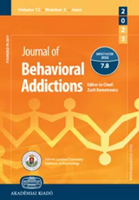Longitudinal associations between psychiatric comorbidity and the severity of gambling disorder: Results from a 36-month follow-up study of clients in Bavarian outpatient addiction care
Longitudinal associations between psychiatric comorbidity and the severity of gambling disorder: Results from a 36-month follow-up study of clients in Bavarian outpatient addiction care
Author(s): Pia M. Wullinger, Andreas M. Bickl, Johanna K Loy, Ludwig Kraus, Larissa SchwarzkopfSubject(s): Individual Psychology, Experimental Pschology, Behaviorism, Management and complex organizations, Substance abuse and addiction, Health and medicine and law
Published by: Akadémiai Kiadó
Keywords: gambling disorder; psychiatric comorbidity; outpatient addiction care; longitudinal study; anxiety disorders; affective disorders;
Summary/Abstract: Background and aims: Individuals with gambling disorder (GD) often suffer from psychiatric comorbidities. Previous studies demonstrated greater severity of GD among gamblers with psychiatric comorbidities. However, evidence on the association between psychiatric comorbidity and course of GD severity during and after outpatient treatment is sparse. This study analyses data from a longitudinal one-armed cohort study on outpatient addiction care clients over three years. Methods: We investigated the course of GD severity using data from 123 clients in 28 outpatient addiction care facilities in Bavaria using generalized estimation equations (GEE). We applied timep interaction analyses to examine different development profiles in participants with and without (1) affective disorders, or (2) anxiety disorders, and (3) to account for the co-occurrence of both. Results: All participants benefitted from outpatient gambling treatment. Improvement in GD severity was poorer in participants with anxiety disorders compared to participants without anxiety disorders. The co-occurrence of affective and anxiety disorders was linked to a less favourable course of GD than the presence of affective disorders alone. However, the combined occurrence of both disorders was more favourable than the presence of anxiety disorders alone. Discussion and conclusions: Our study suggests that clients with GD, with and without psychiatric comorbidities, benefit from outpatient gambling care. Psychiatric comorbidity, especially comorbid anxiety disorders, seems to be negatively associated with the course of GD within outpatient gambling care. Addressing psychiatric comorbidity within the treatment of GD and offering individualised help are required to meet the needs of this clientele.
Journal: Journal of Behavioral Addictions
- Issue Year: 12/2023
- Issue No: 2
- Page Range: 535-546
- Page Count: 12
- Language: English

